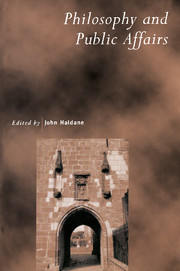Book contents
- Frontmatter
- Contents
- Notes on Contributors
- Introduction
- In Defence of Individualism
- Market Boundaries and Human Goods
- A Tale of Three Karls: Marx, Popper, Polanyi and Post-Socialist Europe
- Liberty's Hollow Triumph
- Politics, Religion, and National Identity
- Contemporary Art, Democracy, and the State
- Popular Culture and Public Affairs
- Welfare and the State
- Questions of Begging
- Philosophy and Educational Policy
- What did John Dewey Want?
- Educating for Citizenship
- Being Human: Science, Knowledge and Virtue
- Index
Introduction
Published online by Cambridge University Press: 20 May 2010
- Frontmatter
- Contents
- Notes on Contributors
- Introduction
- In Defence of Individualism
- Market Boundaries and Human Goods
- A Tale of Three Karls: Marx, Popper, Polanyi and Post-Socialist Europe
- Liberty's Hollow Triumph
- Politics, Religion, and National Identity
- Contemporary Art, Democracy, and the State
- Popular Culture and Public Affairs
- Welfare and the State
- Questions of Begging
- Philosophy and Educational Policy
- What did John Dewey Want?
- Educating for Citizenship
- Being Human: Science, Knowledge and Virtue
- Index
Summary
Whoever promotes the common good of the community simultaneously promotes their own good; first, because individual well-being cannot exist without the well being of the family, the city or the realm … and second because being part of the family or of the city it is right to consider personal well-being in the light of what is prudent with regard to the common good.
Thomas Aquinas, Summa Theologiae, IIa, IIae, q. 47, a. 10It is sometimes said that philosophy begins with curiosity; but it would be as true to say that it starts in confusion (where any particular enquiry ends up depends on the gifts of those involved). Typically one finds oneself faced with a conflict between experience and reflection, or within thought itself. Certain things seem obviously morally impermissible say, but it appears impossible to conceive how anything could be, in and of itself, always and everywhere absolutely wrong. Justice seems to require redistributing wealth for the sake of welfare, yet compulsory taxation can also appear a paradigm of injustice: state-organised theft. Society represents itself as a voluntary association of free individuals, yet our sense of ourselves as voluntary agents is something formed by society not something antecedent that we bring to it.
So it continues. Natural rights may be as Bentham suggested ‘nonsense on stilts’, yet the liberal, political sensibility that he did much to form, finds ‘rights’ talk not just convenient but compelling.
- Type
- Chapter
- Information
- Philosophy and Public Affairs , pp. 1 - 6Publisher: Cambridge University PressPrint publication year: 2000

